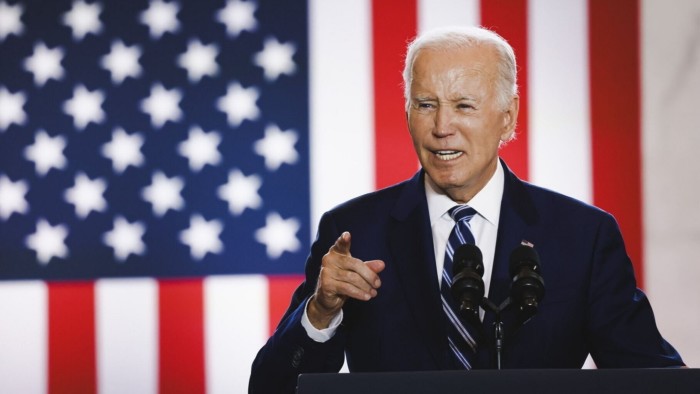Share this @internewscast.com
Unlock the White House Watch newsletter for free
Original Sin suggests a deep investigation into the source of a problem, namely Donald Trump’s presidency, but the book actually covers only the period from 2023 to 2024. Rather than tracing events back to their true origins, the authors pinpoint blame merely two years prior, when an aging Joe Biden decided to seek re-election. This decision was questionable, and the subsequent concealment of his waning health was even more problematic. Fellow party members, who failed to insist he step down before a televised debate unveiled his vulnerabilities last summer, must now reckon with their failure to act.
However, this situation wasn’t the true “origin” of the problem. Biden is being used as a scapegoat for a deeper issue within the Democratic Party—a persistent acceptance of candidates who are likely to lose elections.
The real “sin” or downfall was the Democrats’ decision to run Hillary Clinton as their candidate in 2016. This pivotal choice altered the course of history. Despite polling that highlighted her unpopularity, and her previous failure to capitalize on a significant lead against Barack Obama in the primaries eight years earlier, the party proceeded. Her reputation may be undeservedly poor—she’s no more dishonest or inconsistent than most politicians—but she lacks charisma. The Democrats ignored the clear signs of her unpopularity, resulting in a Trump presidency that might have been avoided.
The other event that led us to where we are today was the elevation of Kamala Harris as Biden’s running mate in 2020. Given his age, the Democrats were all but naming a future president. Again, they were spoilt for clues about her limitations. She had been the first candidate of note to withdraw from the primaries. Those who outlasted her included the mayor of Indiana’s fourth-largest city.
Biden carries nominal blame for choosing her as running mate, but “choice” is a misleading word here. There was a tacit Democratic rule that a white man couldn’t run with another white man. So no Pete Buttigieg. The Minnesota senator Amy Klobuchar was a strong performer but also caught up in the recent history and politics of the state in which George Floyd had just been killed, which all but ruled her out. Is there another party that boxes itself in like this?
All in all, Biden’s refusal to stand down in good time comes third in the list of Democratic follies over the past decade. The problem isn’t one man. The problem is a pattern of collective delusion about candidates that goes back to the previous century. Look at margins of defeat. Not since Barry Goldwater have the Republicans misjudged the fit of nominee and electorate quite as badly as the Democrats did with George McGovern, Walter Mondale and Michael Dukakis.
In the 50-50 nation of today, the Democrats are always competitive. As a result, it is easy to miss the stunning narrowness of their candidates. Tim Walz was the first person on either the upper or lower half of a Democratic presidential ticket since 1980 who hadn’t gone to law school. There has been no southerner on the top since Al Gore at the turn of the millennium, despite the mistrust that Democrats must overcome there. Last November, in a contest that it rightly described as existential for the constitution, the party put up a pair from California (which hasn’t voted Republican since the 1980s) and Minnesota (which didn’t even vote Republican in the 1980s). This is a party that is always willing to meet conservative-minded swing voters one-tenth of the way.
To be bad at choosing a leader is to be bad at politics. Whatever else seems to matter in that trade, such as ideas and tactics, it flows from the paramount individual in a party. Good leaders will tend to get these things right. The likes of Harris, or Ed Miliband or Jeremy Corbyn in the UK, reliably won’t. If this logic seems circular — “winners win” — I’m afraid that is politics. There should be more research and commentary on what constitutes “it”, otherwise known as the X-factor, than on campaigns, manifestos and other outputs of politics, the study of which is an exercise in looking through a telescope from the wrong end.
The question is why the Democrats in particular so often err at leadership selection. Perhaps parties of the left are necessarily softer on human weakness. The impulse that leads them to protect people without lucrative skills from market forces (a good thing) is the impulse that makes them coddle electoral no-hopers (a bad thing). That would explain why Labour in the UK has so often had the same problem: for each Dukakis, a Kinnock.
Or it might be that progressives, trained to think in terms of structural forces, regard an emphasis on individual talent as unintellectual. Increasingly, a Democrat is someone who pins the rise of Trump on academic abstractions — neoliberalism, oligarchy — but shirks the humdrum work of not choosing a great clucking turkey of a candidate every four years.
Either way, this problem predates and could postdate the Biden years. Even had he quit earlier, the Democrats would in all likelihood still have chosen Harris out of deference to seniority and those unwritten identity norms. With a longer campaign, and therefore more exposure of her mystifying syntax and opaque beliefs, I think she would have done even worse against Trump than she did. Original Sin exposes senior Democrats as people of titanic self-pity. “We got so screwed by Biden as a party,” says one grandee. “We got so screwed by the party as a world,” mumbled one reader.
janan.ganesh@ft.com










